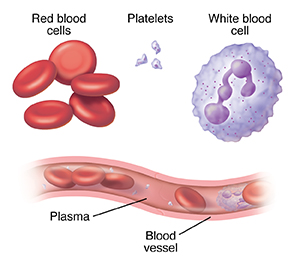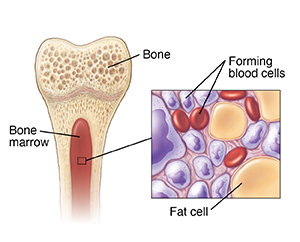A
B
C
D
E
F
G
H
I
J
K
L
M
N
O
P
Q
R
S
T
U
V
W
X
Y
Z
Topic IndexLibrary Index
Click a letter to see a list of conditions beginning with that letter.
Click 'Topic Index' to return to the index for the current topic.
Click 'Library Index' to return to the listing of all topics.
Understanding Blood and Blood Components
Blood is a fluid that flows throughout the body in blood vessels. Blood is needed for life. Blood carries oxygen and nutrients to your organs and tissues and helps remove waste. Blood also helps you fight infections and heal from injuries. This sheet tells you more about blood and its important role in your body.
What are the components of blood?
Blood can be broken down into different parts (components). These components include red blood cells, white blood cells, platelets, and plasma.
-
Red blood cells (RBCs). These carry oxygen to the body. Each RBC lives for about 4 months. RBCs contain a protein called hemoglobin. Hemoglobin allows RBCs to pick up oxygen from the lungs. Iron is needed to make hemoglobin.
-
White blood cells (WBCs). These are part of the body’s immune system. WBCs help fight infections and diseases. There are different types of WBCs. These include neutrophils, lymphocytes, monocytes, eosinophils, and basophils. WBCs live for hours, days, months, or years depending on the specific type.
-
Platelets. These are cells that help with clotting. When you have a cut or bruise, platelets come together to form a clot or "plug." This helps to control bleeding, so your body doesn’t lose too much blood. Platelets live in the body for about 7 to 10 days.
-
Plasma. This is the liquid part of blood. It carries the different types of blood cells to all the parts of the body. Plasma also carries proteins including clotting factors. Clotting factors help platelets with the clotting process.
 |
| Blood cells are carried in plasma through the body’s blood vessels. |
Where is blood made in the body?
Blood and plasma are made in the following ways:
-
Blood cells are made in the bone marrow. The bone marrow is the soft, spongy part inside bones. New blood cells are made daily. They help replace the cells that die naturally or through injury or illness.
-
Plasma is made up mostly of water. Plasma is also made up of different proteins, fatty substances, salt, nutrients, vitamins, and hormones.
 |
| Blood cells are made in bone marrow, located in the center of bones. |
Online Medical Reviewer:
L Renee Watson MSN RN
Date Last Reviewed:
8/1/2024
© 2000-2025 The StayWell Company, LLC. All rights reserved. This information is not intended as a substitute for professional medical care. Always follow your healthcare professional's instructions.